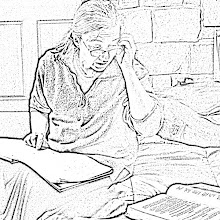I dug a well in a Cambodian village. I sent care packages to inmates in Middle Eastern prisons. I educated several Sudanese children for a year.
And that’s not all.
I bought uniforms, books, and writing paper for children in India whose parents barely earn enough to put food on their table; they could never have sent their children to school without help. I delivered live rabbits and chickens to destitute Indian families so they could raise them for food. And in Africa, I gave away dozens of life-giving goats, goats that provided milk, and thus sustenance, for impoverished families on the brink of hunger.
And I did all this from the comfort of my home.
It was a single incident during a trip to Kenya that spurred me to give in this way: In a church in a mountain village two hours drive from Nairobi, I watched as the poor gave their extra clothing to the poorer in their own church. Their pastor thanked them – and challenged his parishioners to give even more, to bring in extra bedding and blankets and beds to give to others in their church who had no bed or mattress to sleep on. “They sleep on dirt floors,” he announced to the church.
I had seen poverty before, but never a home without a mattress or hammock. I asked to be taken to such a home.
We hiked down a very steep red-earth path to an equally red mud hut. In the doorway stood a widow holding an infant; inside were three young children sitting on the earthen floor. Just sitting there – not chattering, not running around, not reacting to my presence.
Something wasn’t right.
“What is wrong with the children?” I asked my travel companion, a woman who had worked in refugee camps in Africa.
“These kids are starving. Literally.” Indeed, we saw no food in the house, other than the flour, oil, and sugar that we had just brought as a gift. For furniture, the house had but one chair. For bedding, just a few rags. The “kitchen” was a few stones on the ground where ashes marked the remains of the cooking fire. The single pot was empty.
Indeed, we saw no food in the house, other than the flour, oil, and sugar that we had just brought as a gift. For furniture, the house had but one chair. For bedding, just a few rags. The “kitchen” was a few stones on the ground where ashes marked the remains of the cooking fire. The single pot was empty.
The children, we learned, were six, four, and three. The “infant” was over a year old. The three-year-old had not yet learned to walk. She just sat dull-eyed on the uneven floor without the energy to get up.
The scene haunted me long after I was back in Nairobi. I’d never seen starvation with my own eyes. I’d never seen a house with so little in it.
“What can we do for that widow?” I pondered aloud, discussing with my fellow traveler how we could help.
“If we send her more food, it’ll run out in a while. What if we bought her chickens?” I mused. “They could eat the eggs. But I’m not sure what they would feed the chickens. Hey – how about a goat? They eat almost anything, and they produce milk. If we buy her a lactating goat, the children could have milk right away. I read about tribes in Africa that subsist on milk alone for periods of time.”
The lactating goat, purchased for $35, was delivered a few days later – right during the funeral of one of the children. For that child, it was too late. But for the others, milk from that goat would make a difference – the difference between life and death.
It’s only by God’s grace that I was born in North America into a family that never knew the kind of starvation that is all too common in other parts of the world. Maybe, I once read in a book, God is testing you by placing you in North America. Maybe He gave you the wealth you have to see what you would do with it – spend it for your own pleasures, or do as the Bible says and share it with the less fortunate. “Whoever is kind to the needy honors God” (Proverbs 14:31b).
Sometimes the issue of poverty seems so overwhelming that we are immobilized. The problem seems too immense for one person. But if we each did our part, each bought a goat to distribute instead of purchasing another change of clothing or streaking our hair or dining out, we would make a huge impact. I know that I change the fate of many families with goats and chickens and wells and medicine.
And now my children, through my teaching and my example, are making a difference, too. They’ve heard my story and have seen the pictures. Now they, too, send in their coins or part of their tithe to buy a few more goats for the children of Africa. I can imagine the joy in the faces of the recipients.
Jesus said, “Whatever you did for one of the least of these brothers of mine, you did for me.” (Matthew 25:40).
“Someday in heaven, Jesus will thank me for all the goats I bought Him,” 12-year-old Larissa said.
Wednesday, October 15, 2008
What can one person do?
Subscribe to:
Post Comments (Atom)
“What we have done for ourselves alone dies with us; what we have done for others and the world remains and is immortal.”— Albert Pike, Scottish Rite Freemason (1809-1891)



No comments:
Post a Comment